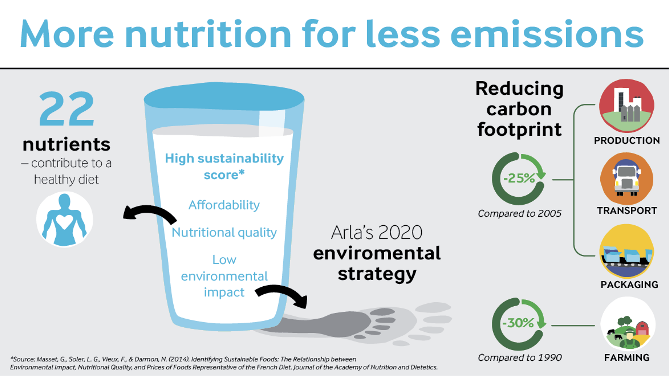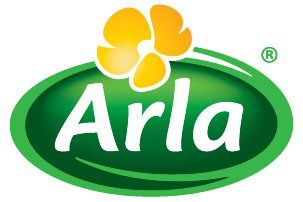
Press release -
Milk provides more nutrition for less emissions
Milk is a good choice if you want a relatively affordable food product with a low impact on climate, in relation to its high nutritional value. New research suggests that milk has a high sustainability score and Arla aims to make it even higher by lowering emissions from farming, production, transport and packaging.
For years the environmental impact of different foods has been discussed by researchers. But recent research into sustainable diets is pointing towards taking the nutritional aspect into account when it comes to considering the environmental cost of individual foods.
According to a new study from the Academy of Nutrition and Dietetics, milk is one of the food sources that makes the most sense to eat when you look at both the nutritional value and the environmental impact. And at the same time, it’s a relatively affordable food product that a growing number of people in the world will be able to include in their daily diets.
"We believe that our products play a natural and important part of a sustainable diet. With a growing population, people’s access to safe and nutritious food and our use of the earth’s resources will increasingly be an issue. This development is a business opportunity for Arla and its dairy farmers, because we see ourselves as being part of the solution," explains Jais Valeur, Executive Vice President, Global Categories and Operations in Arla.
Maintaining health benefits while reducing emissions
Milk and dairy products are a core part of dietary recommendations around the world, because they are affordable and accessible, rich in nutrients and provide high quality protein and many essential vitamins and minerals.
Jais Valeur points to the fact that Arla will be even more focused on maintaining the health benefits of its products, while continuously reducing its carbon footprint per kilo of milk. This will happen through investments, research and innovation, in cooperation with the best scientists and suppliers of dairy technology.
Arla aims to reduce its carbon emissions by 25 per cent from production, transport and packaging, by 2020 (compared to the 2005 baseline). And with the recent Sustainable Dairy Farming strategy, Arla is committed to reduce the carbon footprint per kilogramme of milk by 30 per cent at farm level, by 2020 (compared to the levels of 1990).
"Among Arla’s owners, we have some of the world’s most efficient dairy farmers, when it comes to reducing carbon footprint per kilo of milk. We are now using their farm management procedures and our new research in this area, to help and inspire more Arla farmers and further reduce our total emissions," says Jais Valeur.
What is a sustainable diet?
The Food and Agricultural Organisation (FAO) defines sustainable diets as "those diets with low environmental impact, which contribute to food and nutrition security and to healthy life for present and future generations. Sustainable diets are protective and respectful of biodiversity and ecosystems, culturally acceptable, accessible, economically fair and affordable, nutritionally adequate, safe and healthy, while optimising natural and human resources."
Facts:
- According to FAO, milk is one of the most unique foods because of its highly nutritious content and its role in human nutrition.
- Foods of animal origin contain high amounts of essential nutrients and reducing their intake at may be challenging, especially in countries in which the population has a documented risk of nutrient deficiencies;
- Calcium from milk and dairy products is the easiest to absorb by the human body and calcium intake is particularly affected when dairy is excluded from the diet;
- Global dairy production contributes to less than three per cent of global greenhouse gas emissions; European dairy farmers, in general, of which 12,600 are Arla owners, are among the most efficient and sustainable milk producers in the world.
Masset, G., Soler, L. G., Vieux, F., & Darmon, N. (2014). Identifying Sustainable Foods: The Relationship between Environmental Impact, Nutritional Quality, and Prices of Foods Representative of the French Diet. Journal of the Academy of Nutrition and Dietetics. FAO: Milk and dairy products in human nutrition, FAO, Rome 2013. http://www.fao.org/ag/humannutrition/biodiversity/en/ FAO: Milk and dairy products in human nutrition, FAO, Rome 2013. Millward DJ, Garnett T. Plenary Lecture 3: Food and the planet: Nutritional dilemmas of greenhouse gas emission reductions through reduced intakes of meat and dairy foods. Proc Nutr Soc. 2010; 69(1):103-118; Report of the Dietary Guidelines Advisory Committee on the Dietary Guidelines for Americans, 2010.: US Department of Agriculture, Center for Nutrition Policy and Promotion.;2010. Gao X, Wilde PE, Lichtenstein AH, Tucker KL. Meeting adequate intake for dietary calcium without dairy foods in adolescents aged 9 to 18 years (National Health and Nutrition Examination Survey 2001-2002). J Am Diet Assoc. Nov 2006;106(11):1759-1765.http://www.fao.org/docrep/018/i3437e/i3437e.pdf; http://www.fao.org/docrep/012/k7930e/k7930e00.pdf M Hagemann et al/Animal Feed Science and Technology 166 – 167 (2011) 46-58; LP Lesschen et al/ Animal Feed Science and Technology 166 – 167 (2011) 16 – 28; http://www.fao.org/docrep/018/i3437e/i3437e.pdf
Topics
Categories
Arla Foods is a global dairy company and co-operative owned by 12,600 dairy farmers circa 2,800 of whom are British.
Dating back to 1881, Arla’s purpose is to secure the highest value for its farmers’ milk, while creating opportunities for their growth. With production facilities in 11 countries and sales offices in a further 30, Arla is the world’s sixth largest dairy company and largest supplier of organic dairy products. Arla has a total of more than 18,000 colleagues and its products are sold under the well-known brands Arla®, Lurpak® and Castello® in more than 100 countries.
Arla Foods UK is the largest dairy company in the country and is home to leading dairy brands Anchor, Cravendale, and Lactofree. It processes 3.5 billion litres of milk a year and has a turnover of £2.2 billion. As well as being number one in fresh liquid milk, butter, spreads and cream, Arla is the UK’s largest cheese manufacturer. It has also built the world’s largest fresh milk facility located at Aylesbury and has plans for it to be the first zero carbon site of its kind. The UK business has a team of approximately 4,000 colleagues located at its dairies, distribution centres and head office.

